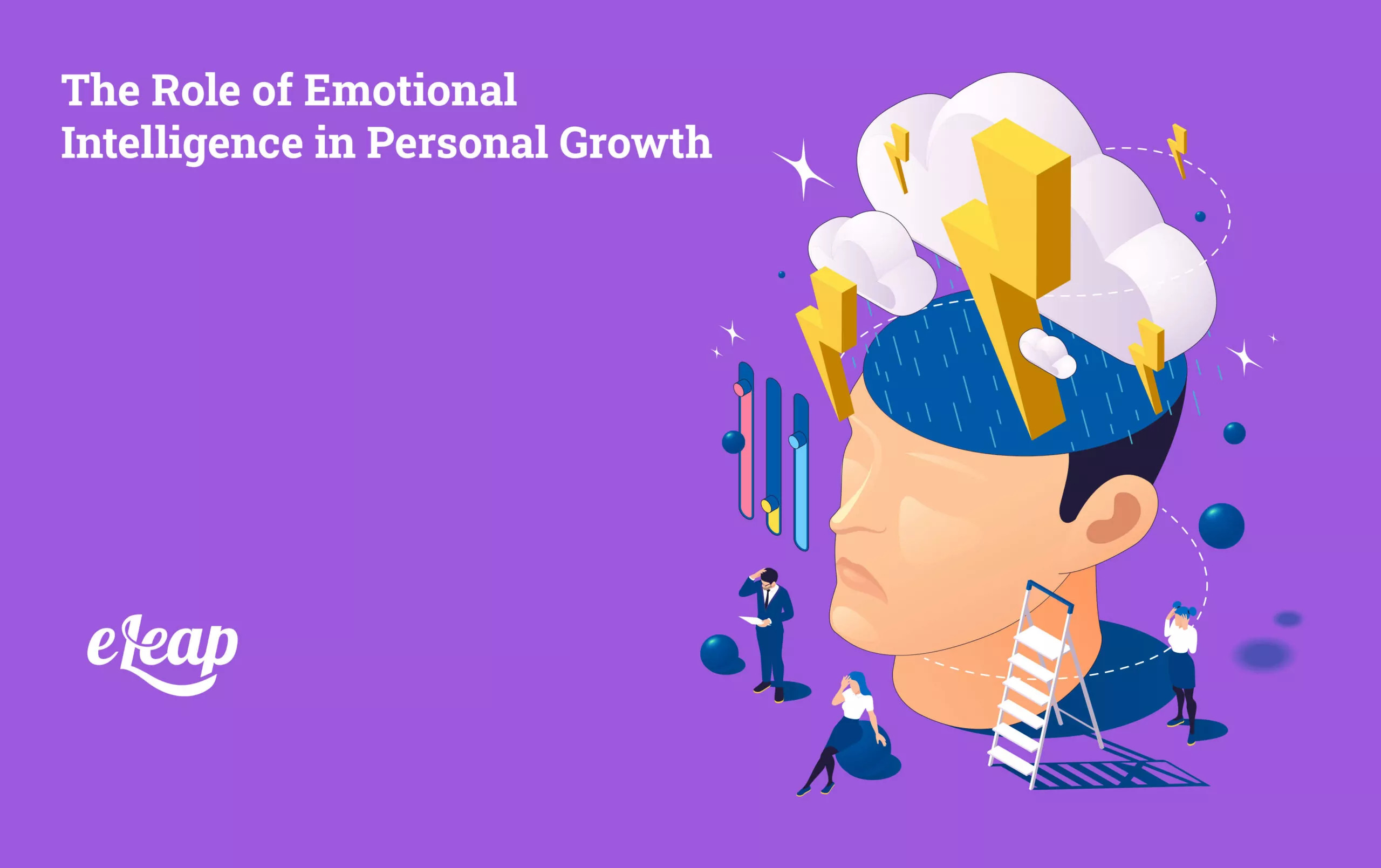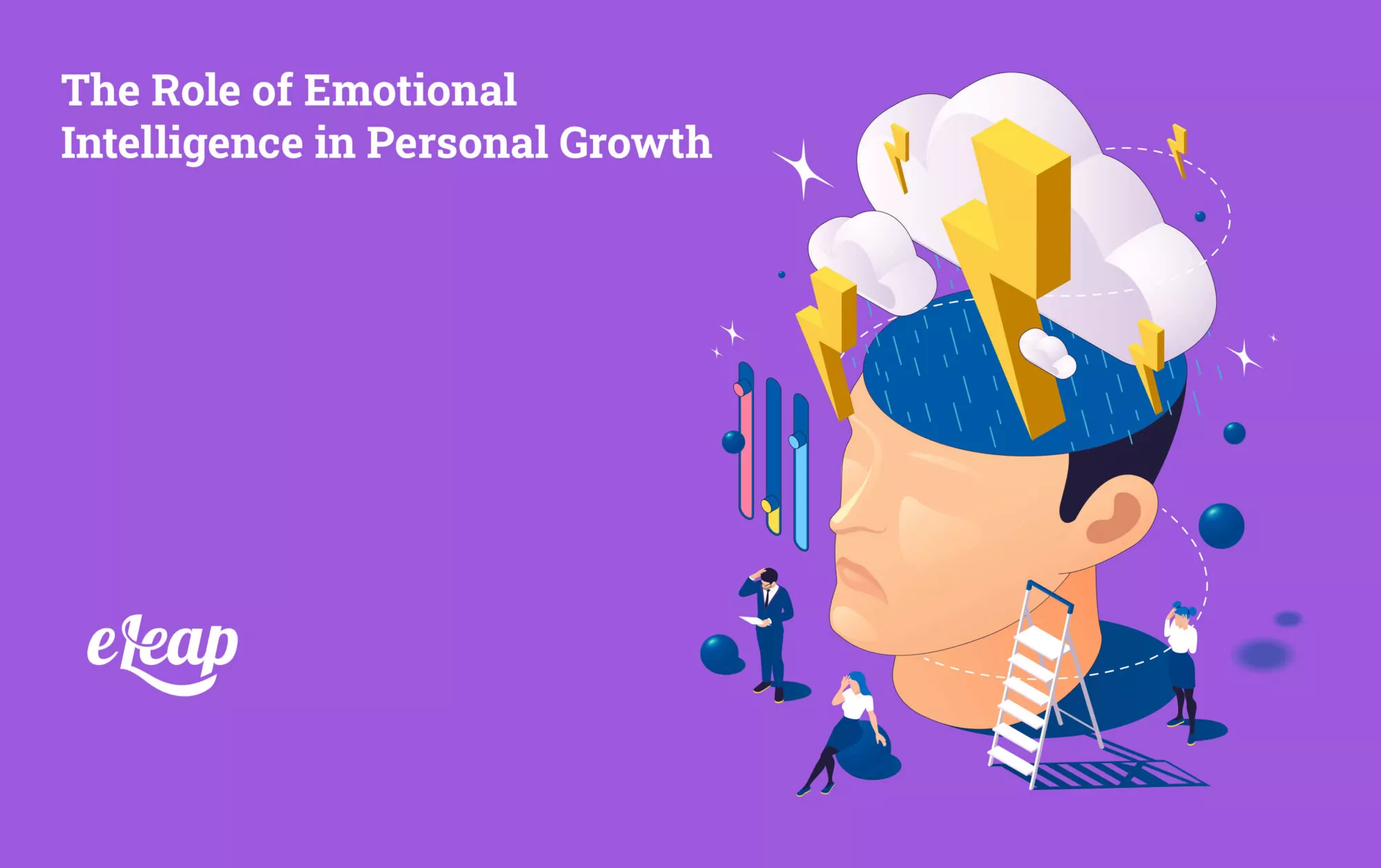The Role of Emotional Intelligence in Personal Growth

Emotional intelligence (EQ) is a transformative skill that influences nearly every aspect of life, from personal relationships to professional achievements. Defined as the ability to understand, manage, and utilize emotions effectively, EQ enables individuals to navigate challenges, build meaningful connections, and achieve personal growth. Unlike IQ, which measures cognitive abilities, EQ delves into the emotional and interpersonal realm, offering tools to live a balanced and fulfilled life.
This comprehensive exploration will uncover how emotional intelligence fosters personal growth, explain its core components, and provide actionable insights for its development. See how eLeaP’s Performance Management Platform helps you apply these insights to drive better results.
What Is Emotional Intelligence?
Defining Emotional Intelligence
Emotional intelligence is the capacity to recognize emotions in oneself and others, regulate those emotions, and use emotional insight to guide thinking and behavior. Coined by psychologists Peter Salovey and John Mayer in the 1990s and popularized by Daniel Goleman, the concept has evolved into a vital skill set for personal and professional success.
Unlike innate talents or intellectual aptitude, emotional intelligence involves learned behaviors and self-awareness. For instance, identifying frustration in oneself and addressing its root cause demonstrates a high level of EQ. On a broader scale, understanding others’ emotions fosters stronger interpersonal bonds and collaborative environments.
Key Components of Emotional Intelligence
- Self-awareness is foundational to EQ. It allows individuals to identify emotions, understand triggers, and assess how feelings influence decisions. This awareness is a prerequisite for personal growth, as it encourages reflection and intentionality.
- Self-regulation involves managing emotional reactions. Individuals cultivate resilience and adapt to changing circumstances by controlling impulses and responding thoughtfully. For example, remaining composed during a heated discussion reflects emotional maturity.
- Motivation within EQ emphasizes internal drive. This intrinsic motivation often aligns with long-term goals, enabling individuals to persevere through challenges without relying on external validation.
- Empathy is the ability to understand and share the feelings of others. Empathy bridges the gap between individuals, promoting trust, collaboration, and compassion. For example, acknowledging a colleague’s stress and offering support strengthens workplace relationships.
- Social skills integrate all other components into actionable behaviors. These include effective communication, conflict resolution, and relationship management, which are crucial for personal and professional interactions.
Emotional Intelligence vs. IQ
IQ evaluates intellectual capabilities, such as problem-solving and logical reasoning. In contrast, EQ measures how effectively one navigates emotional and social landscapes. While a high IQ might predict academic success, EQ plays a more significant role in interpersonal relationships and workplace dynamics. Research suggests that EQ accounts for 58% of job performance, highlighting its importance alongside traditional intelligence metrics.
Emotional Intelligence and Personal Growth
Enhancing Emotional Awareness

Personal growth begins with understanding oneself. Emotional awareness is recognizing emotions as they occur and assessing their impact. This skill helps individuals avoid impulsive decisions, identify their emotional needs, and set boundaries in relationships. For example, recognizing early feelings of burnout allows for proactive stress management.
Emotional awareness acts as a mirror in the context of personal growth, reflecting patterns and areas for improvement. It encourages individuals to confront weaknesses, celebrate strengths, and build a roadmap for self-improvement.
Building Empathy for Stronger Relationships
Empathy is the glue that binds relationships. It enables individuals to step into another’s shoes, fostering mutual understanding and respect. For instance, empathizing with a friend’s challenges strengthens the bond, creating a safe space for emotional expression.
Empathy also transcends personal relationships, benefiting professional environments. Leaders who demonstrate empathy inspire trust and loyalty in their teams. They prioritize others’ needs and perspectives to create a culture of inclusion and collaboration.
Overcoming Challenges with EQ
Life is filled with obstacles, from personal setbacks to professional pressures. Emotional intelligence equips individuals to face these challenges with resilience and grace. Self-regulation, a critical component of EQ, helps individuals stay calm and focused under stress.
For example, a professional facing tight deadlines can use self-regulation to prioritize tasks and maintain a positive attitude. Motivation further supports resilience by providing the determination needed to overcome difficulties.
Achieving Goals Through Emotional Mastery
Goal achievement requires emotional clarity. Emotional intelligence ensures that actions align with intentions, minimizing distractions and fostering consistency. For example, a motivated individual with high EQ will set realistic goals, anticipate potential hurdles, and navigate setbacks effectively.
How to Develop Emotional Intelligence
Practicing Self-Reflection and Mindfulness
Self-reflection is the cornerstone of emotional intelligence. Individuals gain valuable insights into their inner world by dedicating time to evaluating emotions and behaviors. Journaling, for example, can reveal patterns in reactions to stress, helping individuals identify areas for growth.
Mindfulness complements self-reflection by encouraging present-moment awareness. Techniques like meditation and mindful breathing calm the mind, making it easier to process emotions objectively. Over time, mindfulness fosters a deeper connection to oneself, enhancing overall emotional intelligence.
Developing Empathy and Compassion
Cultivating empathy involves active listening, observing non-verbal cues, and considering others’ perspectives. These practices deepen understanding and build meaningful connections. Compassion extends empathy by inspiring supportive actions, such as offering help or encouragement during difficult times.
For example, in a workplace setting, recognizing a colleague’s struggles and providing assistance demonstrates emotional intelligence and strengthens team dynamics.
Enhancing Communication Skills
Communication is a central pillar of EQ. Effective communicators balance clarity with emotional sensitivity, ensuring that messages are understood and well-received. Non-verbal communication, such as tone and body language, plays a significant role in this process.
Active listening is another critical skill requiring full attention and genuine interest. When individuals feel heard, trust and rapport naturally follow. Strong communication skills enhance both personal relationships and professional collaborations.
Stress Management for Emotional Stability
Stress is inevitable, but its impact can be mitigated with proper management techniques. Emotional intelligence provides tools to identify stressors, maintain perspective, and respond constructively. Exercise, time management, and relaxation techniques build emotional resilience, ensuring stability during high-pressure situations.
Emotional Intelligence as a Catalyst for Success
EQ in Leadership and Team Collaboration
Leaders with high emotional intelligence inspire and guide others effectively. They understand team dynamics, navigate conflicts gracefully, and adapt their communication to individual needs. This approach fosters a collaborative environment where creativity and productivity thrive.
For example, emotionally intelligent leaders prioritize employee well-being, increasing engagement and retention rates. By building trust and fostering open communication, they empower teams to excel.
Resolving Conflicts Through Emotional Insight
Conflict resolution is a practical application of EQ. Individuals can address issues without escalating tension by understanding the emotions underlying disagreements. This approach transforms conflicts into opportunities for growth and understanding.
For example, mediating a workplace disagreement with empathy and tact ensures a fair resolution while preserving professional relationships.
Long-Term Success Linked to Emotional Mastery
Studies confirm the correlation between emotional intelligence and long-term success—individuals with high EQ report greater life satisfaction, better health, and stronger relationships. Emotional mastery also enhances adaptability, ensuring success in an ever-changing world.
Applying Emotional Intelligence in Everyday Life
Improving Interpersonal Relationships
Everyday interactions offer opportunities to apply EQ. Recognizing and validating others’ emotions strengthens bonds and reduces misunderstandings. For instance, acknowledging a partner’s feelings during a disagreement fosters reconciliation and trust.
Making Better Decisions
Emotional intelligence refines decision-making by balancing logic with emotional awareness. By understanding how emotions influence choices, individuals can approach situations objectively. For example, pausing to assess emotional triggers before responding ensures thoughtful and practical decisions.
Creating a Balanced Life
EQ supports holistic well-being by promoting emotional balance, self-care, and meaningful connections. Integrating emotional intelligence into daily routines enhances personal and professional satisfaction, creating a life of fulfillment and harmony.
Conclusion
Emotional intelligence is a powerful tool for personal growth. It offers insights into emotions, relationships, and life’s challenges. By understanding and applying its principles, individuals can enhance their relationships, achieve goals, and lead more fulfilling lives.
Incorporating tools like eLeaP can amplify this journey. As a leading provider of innovative learning solutions, eLeaP supports professionals in developing essential skills, including emotional intelligence. BCommittingto EQ development will pave the way for transformative growth and lasting success.